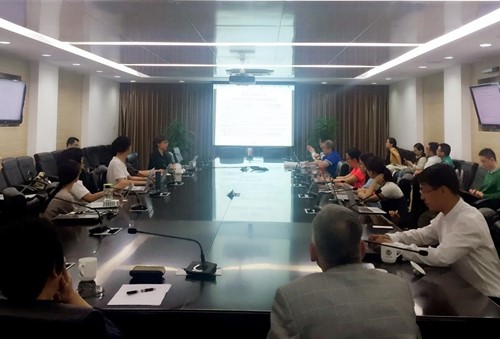PKU Wang Tieya International Law Lecture - China's Non-Market Economy Status Treaty Interpretation
Date:2017-05-29
In the afternoon, May 11, "Peking University Wang Tieya International Law Lecture - China's non-market economy status Treaty Interpretation " Lecture was successfully held in the (Leo) Koguan Building, Room 307. United States Wayne University Law School Lifelong Professor, Peking University Institute of International Law, part-time researcher Ms. Qiao Ya was invited as guest speaker to this lecture and Peking University Law School Song Ying associate professor acted as vice president, associate professor Zhang Zhiyong acted as a commentator.

Ms. Qin obtained a bachelor's degree in law from Peking University in 1983, then went to Harvard University and obtained a Master's degree (1985) and PhD (1990) in Law from Harvard University, Served as a visiting professor at many universities, including Visiting Professor of University of Washington (St. Louis), USA (January-June 2007), Visiting Professor of International College, Seoul National University, Korea (September 2011 - August 2012), Visiting Professor of University of Michigan Law School, USA (September 2013 - January 2014). Now she is Lifelong Professor of Wayne University Law School in the United States, part-time researcher of Peking University Institute of International Law, her main research areas are the international economic law and the World Trade Organization Law.
Interpretation can not leave the entire WTO multilateral treaty system. Article 6 of the GATT and the Anti-Dumping Agreement are the context of the accession to China's accession to the WTO. She pointed out deeply that "NME status" is not about whether China is a market economy. In the summary stage, Professor Qin Ya once again stressed: First, "the extent of the WTO rules of impairment" need to combine the context, and to ensure that the interpretation of the system consistency, that is, "minimize the damage." Second, for the case of unknown text, need to be clarified in the historical context. Thirdly, unilateral expectations are unprotected in the WTO law.
In the subsequent evaluation stage, Ms. Song Ying and Mr. Zhang Zhiyong all gave high evaluation on Professor Qin’s wonderful lecture. Mr. Zhang Zhiyong believed that the essence of this case is how to explain the issue of the treaty, but the characteristics of the corresponding interpretation /and ideas on different types of treaties are different. On the one hand, to maintain a unified multilateral rules, on the other hand, to make a reasonable explanation according to the particularity of members, in order to achieve the balance between part of members and the overall membership. At the same time, we should also avoid rules fragmentation. At the end of the review, he profoundly asked: how to maintain the smooth development of international rules? Can it make a trustworthy expectation between members about international rules?
In the question and communication stage, the audience put out questions on the "market economy status of the burden of proof", "the use of meeting documents" and other aspects. Professor Qin Ya answered them one by one, and the students carried out a warm exchange.
Translated by :Wang Mi
Edited by: Ao Minyu



